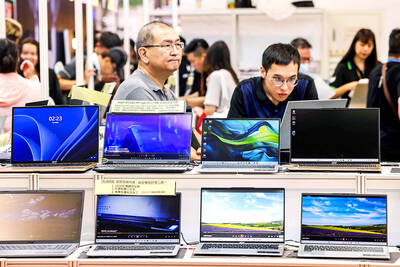Taipei Times (TT): Why did Fox Networks choose Taiwan as its third market to launch the Fox+ service?
Rubin Gandevia: We launched Fox+ in the Philippines and Singapore first. Taiwan is one of our most successful markets in Asia. We have millions of fans across many genres. Our fans are very powerful. They know National Geographic, Star, Movies and Fox Sports. They know everything. We have a good partnership here, so we feel it is a good place to launch. And Taiwanese have taken to online streaming quite well.
TT: How many subscribers does the new service have?

Photo: Lisa Wang, Taipei Times.
Gandevia: We do not share global numbers, but I can tell you that since we launched the service a few weeks ago in the Philippines and Singapore, we have had millions of downloads, and on app stores it ranks among the highest.
TT: Fox chose Chunghwa Telecom Co (中華電信) to distribute the service exclusively. Will it make the service available for other local telecoms or cable operators?
Gandevia: Yes, but we are still negotiating and finalizing details. We would like to reach out to every consumer and platform in Taiwan within a year.
Our partners in Taiwan are very good and we want more. We are not a new player in this market. If we do not want to be disrupted, we have to be active in [building] an ecosystem.
[Chunghwa Telecom told the Taipei Times it has exclusive rights to distribute the Fox+ service for six months.]
TT: What is your pricing strategy?
Gandevia: We prefer to give franchises pricing control because most of those customers already have access to our channels, so we want to offer those people discounts.
TT: What is your take on competition in the Taiwanese market since Netflix and iQiyi Science & Technology Co (愛奇藝), China’s largest video-on-demand (OTT) provider, entered the market more than a year ago?
Gandevia: There is always competition. There is competition in the linear TV [cable TV] space too. Fox does not evade it. This is no different than the existing competition. There is less competition in virtual space because in linear TV there are dozens of channels. In virtual space there are just a few apps. We are very confident and optimistic [about the new service]. This is just another distribution mechanism to reach the consumers.
TT: Netflix is making its first Taiwanese film, Bardo (擺渡身), in partnership with a Taiwanese director, after its first Taiwanese TV series, The Teenage Psychic (通靈少女), which thrilled local audiences. Does Fox have any plans to produce local content?
Gandevia: We do hundreds of local shows already. We have been doing that for decades. A new player who wants to do the same thing can only do it at a much slower rate. We are an established player in localization. We have made hundreds of Taiwanese products. We also make high-quality TV shows from Hong Kong, China and Singapore. We want to do more local content.
We want to bring Hollywood quality to Chinese products.
We just launched a TV show, Trading Floor. The producer, Andy Lau (劉德華), is from Hong Kong.
The story is about a stock broker who has a lot of sex and takes a lot of drugs. The show has big stars and a big producer. It is very high-quality, almost equal to movie quality.

TECH TITAN: Pandemic-era demand for semiconductors turbocharged the nation’s GDP per capita to surpass South Korea’s, but it still remains half that of Singapore Taiwan is set to surpass South Korea this year in terms of wealth for the first time in more than two decades, marking a shift in Asia’s economic ranks made possible by the ascent of Taiwan Semiconductor Manufacturing Co (TSMC, 台積電). According to the latest forecasts released on Thursday by the central bank, Taiwan’s GDP is expected to expand 4.55 percent this year, a further upward revision from the 4.45 percent estimate made by the statistics bureau last month. The growth trajectory puts Taiwan on track to exceed South Korea’s GDP per capita — a key measure of living standards — a

READY TO HELP: Should TSMC require assistance, the government would fully cooperate in helping to speed up the establishment of the Chiayi plant, an official said Taiwan Semiconductor Manufacturing Co (TSMC, 台積電) yesterday said its investment plans in Taiwan are “unchanged” amid speculation that the chipmaker might have suspended construction work on its second chip packaging plant in Chiayi County and plans to move equipment arranged for the plant to the US. The Chinese-language Economic Daily News reported earlier yesterday that TSMC had halted the construction of the chip packaging plant, which was scheduled to be completed next year and begin mass production in 2028. TSMC did not directly address whether construction of the plant had halted, but said its investment plans in Taiwan remain “unchanged.” The chipmaker started

MORTGAGE WORRIES: About 34% of respondents to a survey said they would approach multiple lenders to pay for a home, while 29.2% said they would ask family for help New housing projects in Taiwan’s six special municipalities, as well as Hsinchu city and county, are projected to total NT$710.65 billion (US$23.61 billion) in the upcoming fall sales season, a record 30 percent decrease from a year earlier, as tighter mortgage rules prompt developers to pull back, property listing platform 591.com (591新建案) said yesterday. The number of projects has also fallen to 312, a more than 20 percent decrease year-on-year, underscoring weakening sentiment and momentum amid lingering policy and financing headwinds. New Taipei City and Taoyuan bucked the downturn in project value, while Taipei, Hsinchu city and county, Taichung, Tainan and Kaohsiung

Micro-Star International Co (MSI, 微星科技) is expanding notebook computer production in India after partnering with Indian electronics maker Syrma SGS Technology Ltd late last year, as the Taiwanese company seeks to tap into the local market. MSI also plans to manufacture some of its new gaming PCs powered by Nvidia Corp’s RTX 50 graphics cards in India, while adding more advanced and design-focused PCs and notebooks at Syrma’s plant in Chennai, a source told the Taipei Times yesterday on condition of anonymity. MSI’s deployment in India is driven not only by cost advantages, but also by India’s rapidly expanding consumer market and